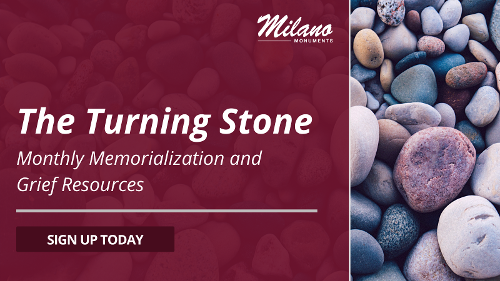This post is part of our Views on Memorialization series, where we ask our team members to share their personal perspectives on memorialization. For more stories like this, subscribe to our blog.
In a world where time often blurs the lines of remembrance, there exists a profession dedicated to preserving the essence of lives lived, stories shared and memories cherished.
Milano Monuments owner and president Jim Milano offers a unique perspective—one that has been shaped by a lifetime of crafting tributes that transcend the bounds of time. Growing up in the heart of this industry, Jim's journey has been one of compassion, creativity and connection.
Join us as we delve into his lessons learned from decades of guiding families through the art of memorialization.
What Does Memorialization Mean to You?
Memorialization to me is the ultimate expression of love towards someone who hasn't just passed away, but has lived a remarkable life. Love is at the heart of memorialization—it's the reason behind it all. I define it as the last tangible act of love that we can perform for our cherished ones.
In my experience, I've seen families find comfort in having a physical place to visit. It becomes a place where they can reminisce, share stories and feel close to the person they've lost. Even in the case of cremation and scattering, where there might not be a traditional burial site, creating a special place such as a garden, plaque or memorial bench offer a focal point for remembrance.
Memorialization isn't just about the deceased, it's also for the living. It's for the family members and friends who want to hold onto the memories, who want to ensure that their loved one's legacy lives on. I often tell families that while the person who passed away might not be here to witness the memorial, the act of creating it is for them—and it’s also for the living to find a way to heal and remember.
Why Is Memorialization Important to the Grieving Process?
But beyond just remembering, I believe memorialization is also a crucial part of the healing and grieving process. After the funeral is over and the initial shock has subsided, we're left with a void, a sense of loss that needs to be processed.
Memorialization becomes a way to work through this grief and to find a place where we can continue to connect with our loved ones. It's not just a tribute to their existence, but a way to hold on to their essence.
What Have You Learned From Working in the Memorial Business?
As someone who grew up in the memorial business, I've had the privilege of witnessing and being a part of countless stories of love, loss and remembrance. The experiences and insights gained from working alongside my father and immersing myself in this field have profoundly shaped my understanding of memorialization. Some of the invaluable lessons I've learned along the way include the following.
1. The Power of Respect and Compassion
People come to us in the midst of grief, seeking a way to honor and celebrate their loved ones' lives. Treating each family with respect, kindness and genuine compassion is not just an ethical responsibility—it's the cornerstone of creating a meaningful memorial.
2. It's About Them, Not Us
While our expertise and creativity play a crucial role, I've come to understand that the true art of memorialization is in aligning our work with the families' wishes. It's not about showcasing our talents, it's about channeling those talents to bring their visions to life.
3. The Impact of Lasting Tributes
The physical presence of a memorial, whether it's a beautifully crafted monument or a heartfelt garden, becomes a touchpoint for remembrance. Seeing families return to these places to honor their loved ones—whether on special occasions or in quiet moments of reflection—reinforces the significance of the work we do.
Get More Unique Views on Memorialization
While grieving can cause many different emotions, memorialization helps to honor a loved one’s life and center your emotions, resulting in a healthier grieving experience. For additional support and information on the memorialization process, subscribe to our monthly newsletter, The Turning Stone.





